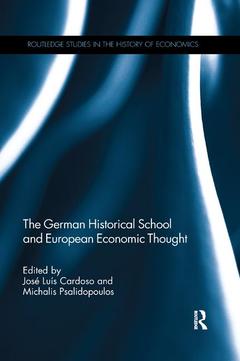The German Historical School and European Economic Thought Routledge Studies in the History of Economics Series
Coordonnateurs : Cardoso José Luís, Psalidopoulos Michalis

The financial crisis of 2008 has revived interest in economic scholarship from a historical perspective. The most in depth studies of the relationship between economics and history can be found in the work of the so-called German Historical School (GHS). The influence of the GHS in the USA and Britain has been well documented, but far less has been written on the rest of Europe.
This volume studies the interconnection between economic thought and economic policy from the mid-nineteenth century to the interwar period. It examines how the School?s ideas spread and was interpreted in different European countries between 1850 and 1930, analysing its legacies in these countries. In doing so, the book is able to trace the interconnection between economic thought and economic policy, adding new voices to the debate on the diffusion of ideas and flow of knowledge. This book identifies issues related to topics such as nationalism and cosmopolitanism in the history of ideas and clarifies themes in policy making that are still currently debated. These include monetary policy and benefits of free trade for all parties involved in international exchanges.
This book will be of a great interest to those who study history of economic thought, economic theory and political economy.
Introduction José Luís Cardoso and Michalis Psalidopoulos 1. The impact of the German Historical School on the evolution of economic thought in Austria Günther Chaloupek 2.The reception of the German Historical Schools among French economists (1857-1900) Jean-Pierre Potier 3.Economics, Statistics and History. The Legacy of the German Historical School in Belgium Guido Erreygers and Maarten Van Dijck 4.On the surface things seemed quiet. The reception of the German Historical School in the Netherlands Bert Tieben and Evert Schoorl 5.The German Historical School of Economics in the Italian Debate (1870 – 1890) Vitantonio Gioia 6.The German Historical School in Spain. From the fringes to mainstream (1870-1936) Jesús Astigarraga and Juan Zabalza 7.The Influence of the German Historical School in Portugal António Almodovar and José Luís Cardoso 8.The Legacy of the German Historical School in Greek Economic Thought and Policy Michalis Psalidopoulos and Yorgos Stassinopoulos 9.A Hundred Years of German Connection in Turkish Economic Thought: Historismus and Otherwise Eyüp Özveren 10.Sweden and the Historical School: Eight Scholars going to Germany, 1874-1906 Benny Carlson 11.The Influence of German Historical School on Economic Theory and Economic Thought in Russia Vladimir Avtonomov and Georgy Gloveli 12. The Evolution of German Historical School in Bulgaria (1878-1944) Nikolay Nenovsky and Pencho D. Penchev Concluding Remarks Harald Hagemann
José Luís Cardoso is a research professor at the Institute of Social Sciences, University of Lisbon, Portugal.
Michalis Psalidopoulos is a professor at the Department of Economics, University of Athens and chairman of the board and scientific director of the Centre for Planning and Economic Research, Athens, Greece.
Date de parution : 12-2019
15.6x23.4 cm
Date de parution : 11-2015
15.6x23.4 cm
Thème de The German Historical School and European Economic Thought :
Mots-clés :
Young Men; Institut Des Sciences Sociales; Austrian Upper House; Cognetti De Martiis; Forjaz De Sampaio; GHS; Gustav Von Schmoller; Historical School; Bismarck's Social Reforms; Young GHS; Giornale Degli Economisti; Fedele Lampertico; Soziale Frage; De Laveleye; Giner De Los; Italian Historical School; Katheder Socialists; Institut De Sociologie; Greek Economic Thought; Italian Social Sciences; Ricca Salerno; Spanish Tax System; Alexandre Herculano; De Leener; Orthodox Liberal Position



